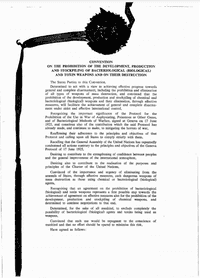
Languages: English, Spanish, French... (6)
The Convention on the Prohibition of the Development, Production and Stockpiling of Bacteriological (Biological) and Toxin Weapons and on their Destruction
[Biological Weapons Convention (BWC)]
The BWC prohibits the development, production, acquisition, transfer, stockpiling and use of biological and toxin weapons. It requires each country to develop national laws and implement measures that effectively prohibit bioweapons and establishes the authority of the Security Council to investigate alleged breaches of the BWC.
SUMMARY
The Biological Weapons Convention (BWC) is an international agreement that prohibits States from developing, producing, or stockpiling biological weapons. Biological weapons are defined as biological agents that have no justification for peaceful purposes and/or are being used in a non-peaceful way. The BWC is the first global treaty to ban an entire category of weapons of mass destruction (WMDs). The BWC has fifteen articles that countries agree to when signing onto the treaty. Key provisions include: I. Definition of biological weapons (general purpose criterion) and range of prohibitions covered, II. Requirement to destroy all existing biological weapons within 9 months of entering the treaty, III. Prohibition against transferring biological weapons to any other State or non-State actors, IV. Requirement for national implementation of the BWC, V. Requirement to consult and cooperate on disputes concerning the purpose or implementation of the BWC, VI. Procedure for lodging a formal complaint about a suspected treaty breach against another country through the UN Security Council, VII. Agreement to provide assistance to another state that has been harmed through a violation of the BWC, VIII. The BWC reinforces states’ obligations under the 1925 Geneva Protocol, X. States assist one another in building peaceful biological capacity and the BWC be implemented so as not to hamper any technological development of peaceful biological capacity.
The BWC entered into force in March 1975 and as of February 2022, has 183 States Parties that have joined the treaty, with four signatories and ten states having neither signed nor ratified. In 2006, the BWC Implementation Support Unit (ISU) was established to provide administrative support to the BWC, support national implementation efforts, receive and distribute confidence building measures, and maintain a database to facilitate international cooperation and assistance. States gather in Geneva for annual Meetings of Experts and Meetings of States Parties. Additionally, Article XII of the BWC calls for a Review Conference once every five years. Its objective is to review the operation of the Convention including relevant scientific and technological developments in order to ensure that the BWC remains fit for purpose. The BWC is available in all official UN languages: Arabic, Chinese, English, French, Spanish, and Russian.

..png)
